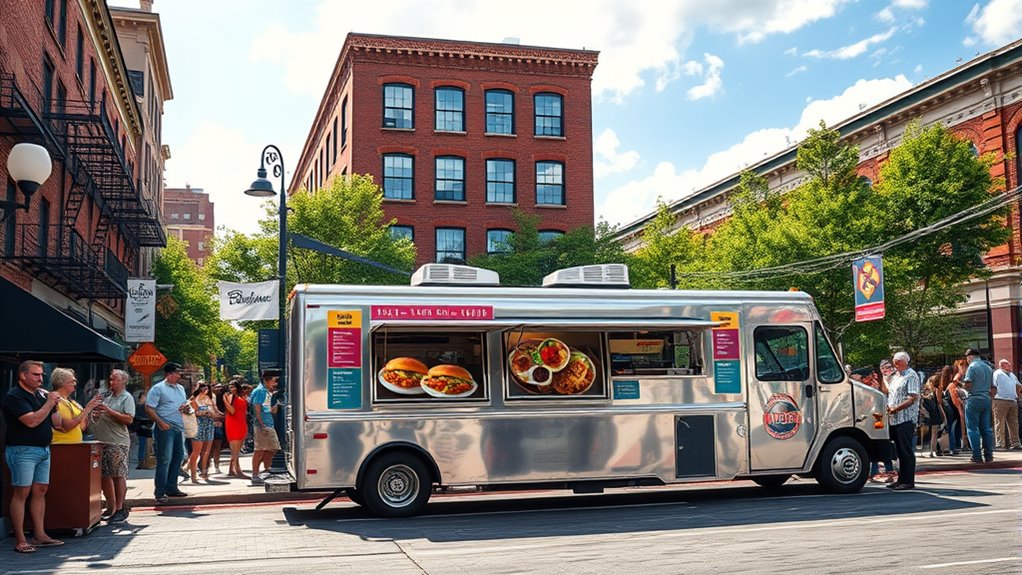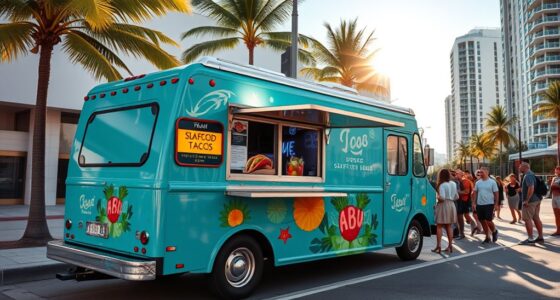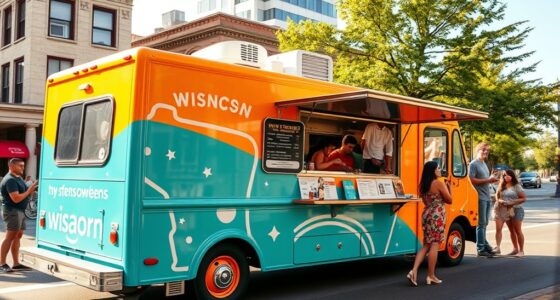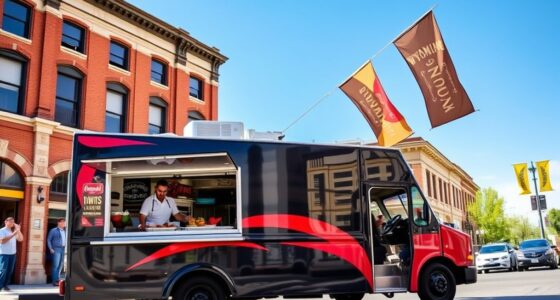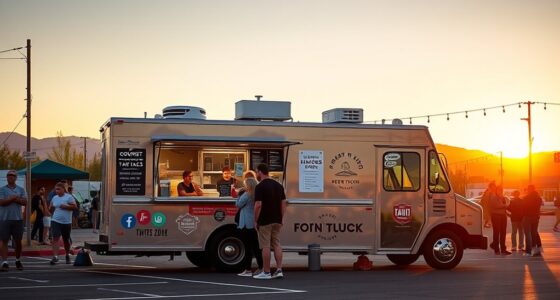To open a food truck in Knoxville, start by obtaining permits from the city, including a Mobile Food Unit permit, and a Tennessee Department of Health license, along with any necessary event permits. Budget $57,000 to $150,000 for setup, branding, and initial supplies. Choose busy locations like downtown zones or private properties, and develop a menu that complies with health regulations. Focus on marketing through social media and events to maximize revenue—continue exploring to get all the details.
Key Takeaways
- Obtain necessary permits including MFU, health license, and event-specific permits, with proper documentation and visible display on the truck.
- Budget $57,000–$150,000 for startup costs, covering vehicle, branding, permits, supplies, and initial inventory.
- Operate in Knoxville’s designated downtown zones or private property with proper permissions, avoiding restricted areas near schools and fire lanes.
- Develop a compliant menu with local flavors, dietary options, and proper labeling, ensuring health standards and attractive presentation.
- Boost visibility via social media, participate in local events, and implement loyalty programs while managing waste and environmental regulations.
Navigating the Permitting Process and Licensing Requirements
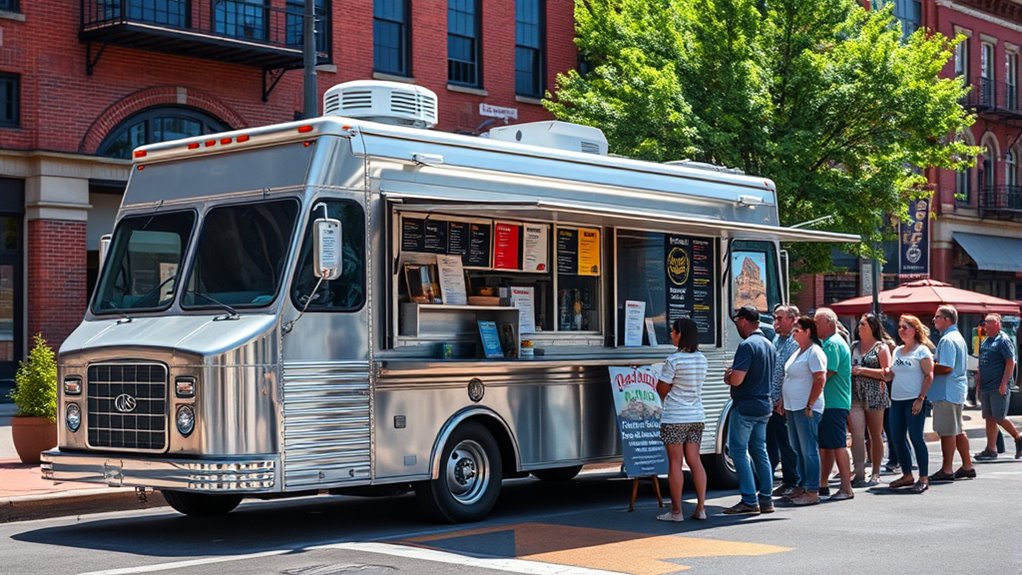
Managing the permitting process and licensing requirements for a food truck in Knoxville can seem complex, but understanding the key steps makes it manageable. First, you’ll need a Mobile Food Unit (MFU) Permit from the city, along with a Tennessee Department of Health License, which must be displayed visibly on your truck. You also need both city and county business licenses if operating within those areas. For specific locations, a Site Permit is required and must also be visible. If you’re participating in special or one-time events, apply for a Temporary MFU Permit costing $75, valid for up to three days. Be prepared to submit application forms, pay fees, provide proof of insurance, driver’s licenses, and possibly lease agreements, ensuring all documentation aligns with city and state health regulations. Additionally, understanding vetted best practices for setup angles and equipment placement can enhance your truck’s efficiency and customer experience.
Understanding Costs for Starting and Operating Your Food Truck
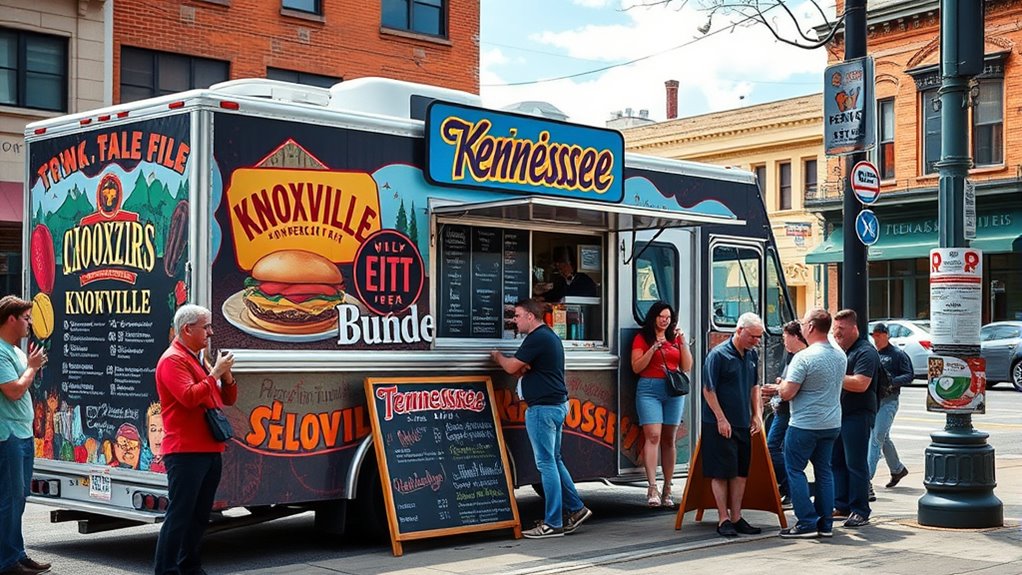
Starting a food truck in Knoxville involves careful budgeting to cover both initial investments and ongoing expenses. Your startup costs can range from $57,000 to over $150,000, depending on the truck’s condition and branding. Expect to spend around $12,000 to $15,000 on vehicle wrapping and branding, plus about $1,000 for opening inventory. Licensing and permits cost roughly $2,000 initially, with $200 annually, and additional permits for events or specific operations may add to expenses. Essential supplies and packaging often total $3,700 to $4,000 upfront. Monthly costs include parking, maintenance ($300+), insurance ($800–$1,200 yearly), and marketing ($3,000 initial, then ongoing). Budget carefully for these expenses to guarantee your food truck’s financial success. Incorporating self-watering plant pots into your branding or cafe setup can help create a sustainable and attractive environment for customers.
Choosing the Best Locations and Operational Zones in Knoxville
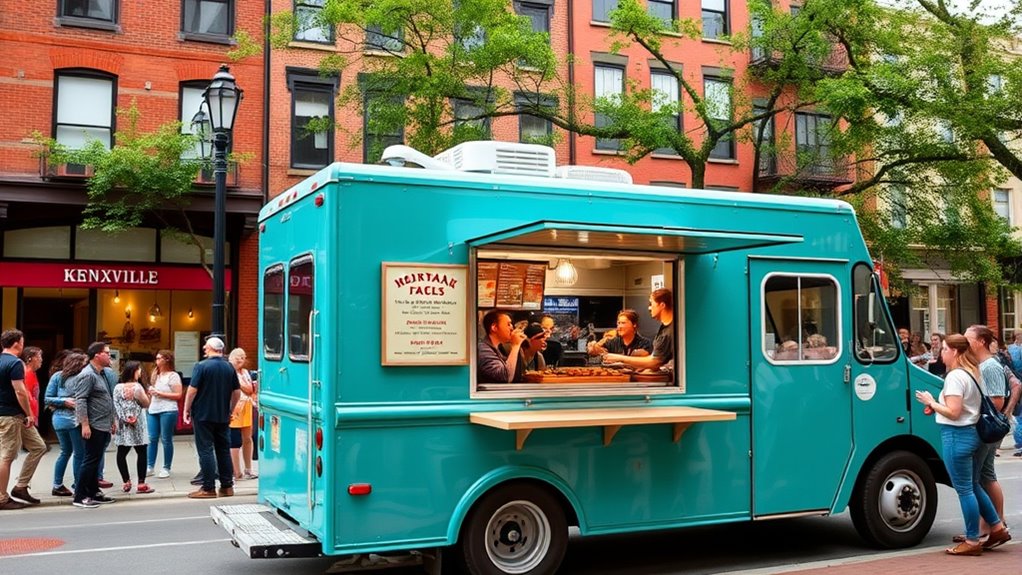
Choosing the right locations for your food truck in Knoxville can greatly boost your sales and guarantee smooth operations. Knoxville’s downtown has five designated zones with parking spaces for trucks, where permits allow operation on public streets for an annual fee. These zones focus on busy foot traffic and commercial hubs, maximizing exposure while maintaining city aesthetics. You can also operate on private property in commercial, industrial, or office districts with owner permission and permits, but must follow zoning restrictions like operating hours. Keep in mind, trucks must stay at least two blocks from schools and avoid blocking sidewalks, ramps, or fire lanes. UTK campus spots are limited and require agreements with campus services. Strategic location choice combines high pedestrian flow with zoning rules for optimal success. Understanding zoning restrictions is essential to ensure your operations comply with local regulations and avoid penalties.
Developing a Compliant and Appealing Menu

Developing a menu that is both compliant with Tennessee and Knoxville food safety regulations and appealing to customers is essential for your food truck’s success. Guarantee all menu items meet Tennessee Department of Health standards, including proper labeling and packaging for any packaged foods. Your preparation areas and equipment must be approved during health inspections, and grease control measures should comply with Knoxville Utilities Board requirements. Balance popular local flavors with unique offerings to stand out and keep menus manageable for quick prep and service. Include dietary options like vegetarian or gluten-free choices to attract a broader audience. Use durable, attractive menu boards displaying permits and safety seals. Regularly update your menu with seasonal or local specialties, and source ingredients locally to boost freshness and support Knoxville’s community. Additionally, ensuring your equipment setup aligns with safety standards is crucial for smooth operation and compliance.
Effective Marketing and Sales Strategies for Food Trucks
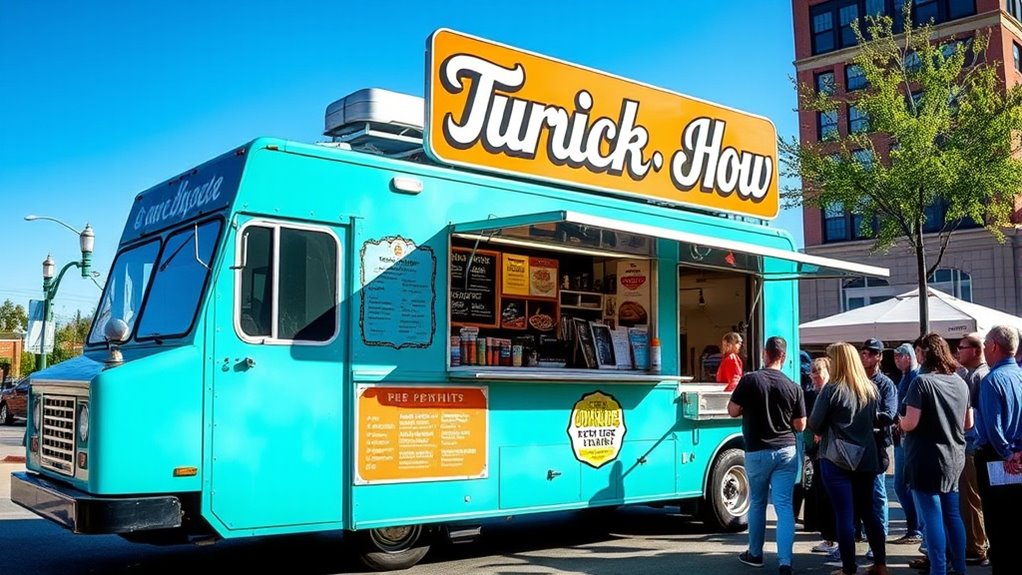
To maximize your food truck’s visibility and sales, implementing effective marketing and sales strategies is essential. Leverage social media platforms like Facebook, used by 75% of food trucks, to boost engagement and increase sales by 20%. Participate in local events and festivals—80% of trucks do this—to build brand awareness and attract new customers. Develop loyalty programs that increase repeat visits by up to 30%, and use email marketing to stay connected. Use data analytics to refine your marketing efforts, improving ROI by 25%. Focus on targeting Millennials and Gen Z with visually appealing branding, trending hashtags, and emphasizing sustainability. Here’s a quick overview:
| Strategy | Key Benefit | Implementation Tip |
|---|---|---|
| Social Media Marketing | Boosts visibility and sales | Regular posts, engaging content |
| Event Participation | Builds local presence | Join festivals, sponsor community events |
| Loyalty & Data Analytics | Increases repeat business | Use digital rewards, track customer data |
A solid understanding of your target audience, including their preferences and behaviors, can significantly enhance your marketing efforts and is supported by the importance of relationships in effective communication.
Managing Waste and Ensuring Environmental Compliance

Managing waste and ensuring environmental compliance are critical for food truck operators to protect public health and avoid penalties. You must direct wastewater to approved facilities like commissaries, restaurants, or RV dump sites connected to sanitary sewers, avoiding storm drains that lead to streams. Regularly inspect water and wastewater plumbing to prevent leaks, and wash your truck only at authorized commercial facilities. Maintain detailed logs for grease control equipment, and coordinate disposal with KUB to prevent sewer blockages. All solid waste must be properly contained and removed after each shift. Use approved methods for waste storage, and ensure your equipment prevents spills. Compliance with Tennessee health regulations and city ordinances is essential to avoid fines, permit revocations, or being dismissed from programs. Additionally, understanding the role of water management in environmental compliance can help maintain proper disposal practices and prevent contamination.
Frequently Asked Questions
How Early Should I Apply for Permits Before Launching My Food Truck?
You should apply for your food truck permits at least 60 days before your planned launch date. This allows enough time for processing, inspections, and addressing any issues that might come up. Submitting early also helps you coordinate with commissaries and site-specific requirements, preventing delays. Waiting until the last minute risks missing deadlines, so give yourself a comfortable buffer to guarantee everything is in place and ready to go on time.
Are There Specific Health Department Inspections Required Before Opening?
You’ll need to complete specific health department inspections before opening your food truck. This includes obtaining a Tennessee Department of Health License and passing a health inspection that checks sanitation, equipment, and safety standards. You must submit a detailed floor plan, proof of water source approval if using well water, and verify all signage complies. Additionally, your unit needs to meet fire safety and waste disposal requirements, and all documents must be displayed visibly on your truck.
Can I Operate a Food Truck on Private Property Without Public Permits?
You can operate a food truck on private property in Knoxville without public permits if you follow zoning rules and obtain necessary permits. You need a valid MFU permit and, if parking outside designated spaces, a Site Permit. Make certain your truck meets health and safety standards, and display your permits visibly. Keep in mind that operating without required permits can lead to penalties, so staying compliant is essential for smooth operation.
What Are the Insurance Requirements for Food Truck Operations in Knoxville?
You need to meet Knoxville’s insurance requirements to operate your food truck legally. This includes proof of commercial auto insurance, covering accidents on public roads, and general liability insurance with at least $1 million coverage for customer injuries or property damage. If you have employees, you’ll also need workers’ compensation insurance. Make sure your policies are current, as proof is required for your mobile food unit permit and during renewals.
How Do I Find Local Events to Participate in as a Vendor?
To find local events where you can participate as a vendor, start by exploring online event calendars like Downtown Knoxville Partnership and tourism sites for seasonal festivals and fairs. Follow social media groups, hashtags, and event pages dedicated to Knoxville’s food scene. Connect with local venues, chambers of commerce, and community organizations. Also, join vendor forums and attend orientation meetings to stay updated on upcoming opportunities and application procedures.
Conclusion
Starting your food truck in Knoxville means maneuvering permits, choosing prime locations, and crafting a menu that draws crowds. With over 300 food trucks thriving nationwide, Knoxville’s growing scene offers endless opportunities. By staying compliant and marketing smartly, you can turn your passion into a profitable venture. Imagine serving delicious bites to hundreds daily—your food truck could become a local favorite in no time. Success is within reach—take the first step today!
